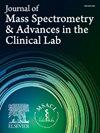Quantification of total sBCMA in human plasma by peptide-level immunocapture LC-MS/MS
IF 3.4
4区 医学
Q2 MEDICAL LABORATORY TECHNOLOGY
Journal of Mass Spectrometry and Advances in the Clinical Lab
Pub Date : 2025-04-01
DOI:10.1016/j.jmsacl.2025.04.006
引用次数: 0
Abstract
Background
B-cell maturation antigen (BCMA) is a membrane protein that is overexpressed in multiple myeloma cells and can be targeted with biotherapeutic agents. BCMA is naturally shed by γ-secretase, leading to the formation of soluble BCMA (sBCMA), which circulates in the blood. sBCMA can affect the efficacy of BCMA-targeted therapies and act as a drug sink. Additionally, sBCMA can interfere with pharmacokinetic measurements when BCMA is directly targeted. Therefore, quantification of this biomarker during clinical trials is essential to assess the effective dose and understand pharmacokinetic results. When quantifying sBCMA using ligand binding assays or hybrid assays, the biotherapeutic can interfere with the capture of sBCMA, leading to an underestimation of its levels.
Methods
Samples were denatured, reduced, and alkylated prior to trypsin digestion. sBCMA peptide enrichment was performed using anti-peptide polyclonal antibodies. Reversed-phase chromatographic separation was conducted on a biocompatible C18 column with an analysis time of sixteen minutes per sample. The SCIEX QTRAP 5500 mass spectrometer operated in multiple reaction monitoring mode. The calibration curve was prepared by spiking recombinant sBCMA into monkey plasma.
Results
The parallelism between the authentic and surrogate matrices, as well as between the endogenous and recombinant proteins, was validated. Comparisons were made between protein and peptide level hybrid assays, with the peptide level approach effectively removing the interference of the biotherapeutic. Additionally, the peptide level immunocapture LC-MS/MS demonstrated ligand tolerance.
Conclusion
The peptide level immunocapture LC-MS/MS analysis eliminated the interference of anti-BCMA biotherapeutics, allowing for the quantification of total sBCMA in clinical samples while achieving a LLOQ of 10 ng/mL.

肽水平免疫捕获LC-MS/MS定量人血浆中总sBCMA
b -细胞成熟抗原(BCMA)是一种在多发性骨髓瘤细胞中过表达的膜蛋白,可作为生物治疗药物的靶点。BCMA通过γ-分泌酶自然脱落,形成可溶性BCMA (sBCMA),在血液中循环。sBCMA会影响bcma靶向治疗的疗效,起到药物沉淀的作用。此外,当BCMA直接靶向时,sBCMA会干扰药代动力学测量。因此,在临床试验中对该生物标志物进行量化对于评估有效剂量和了解药代动力学结果至关重要。当使用配体结合测定法或杂交测定法定量sBCMA时,生物疗法会干扰sBCMA的捕获,导致对其水平的低估。方法在胰蛋白酶消化前对样品进行变性、还原和烷基化处理。利用抗多肽多克隆抗体对sBCMA肽进行富集。在生物相容性C18色谱柱上进行反相色谱分离,每个样品的分析时间为16分钟。SCIEX QTRAP 5500质谱仪在多反应监测模式下工作。将重组sBCMA注入猴子血浆制备校准曲线。结果验证了原基质与替代基质、内源蛋白与重组蛋白的相似性。比较蛋白质水平和多肽水平的杂交测定,多肽水平的方法有效地消除了生物治疗的干扰。此外,肽水平免疫捕获LC-MS/MS显示配体耐受性。结论多肽水平免疫捕获LC-MS/MS分析消除了抗bcma生物治疗药物的干扰,可以定量测定临床样品中总sBCMA, LLOQ为10 ng/mL。
本文章由计算机程序翻译,如有差异,请以英文原文为准。
求助全文
约1分钟内获得全文
求助全文
来源期刊

Journal of Mass Spectrometry and Advances in the Clinical Lab
Health Professions-Medical Laboratory Technology
CiteScore
4.30
自引率
18.20%
发文量
41
审稿时长
81 days
 求助内容:
求助内容: 应助结果提醒方式:
应助结果提醒方式:


